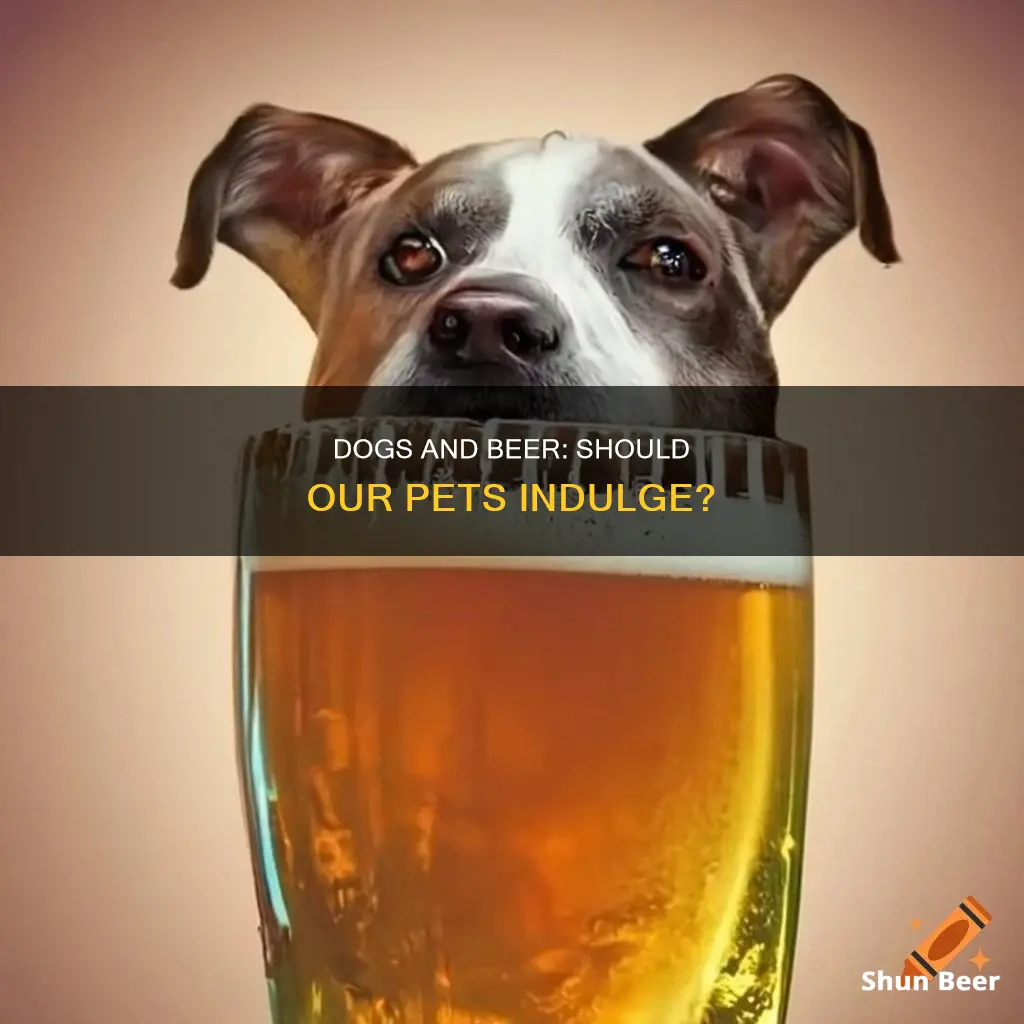
Should dogs drink beer? The short answer is no. Beer is toxic to dogs and even a small amount can be poisonous, leading to alcohol poisoning in as little as 30 minutes. However, there is now a market for dog-friendly, non-alcoholic beer. These brews are made with ingredients such as water, bone broth, vegetables, and fruit, and are said to be healthy for dogs.
Should Dogs Drink Beer?
| Characteristics | Values |
|---|---|
| Safe for dogs to drink beer | No |
| Beer safe for dogs | Beer is toxic to dogs |
| Alcohol-free dog beer safe for dogs | Yes |
| Alcohol-free dog beer healthy for dogs | Yes |
| Beer safe for humans | Yes |
What You'll Learn

Why dogs shouldn't drink beer
Dogs should not drink beer, or any other alcoholic beverage for that matter. Alcohol is toxic to dogs and even a small amount can be poisonous. A dog's body is not designed to metabolise alcohol like a human's body is, and alcohol poisoning can occur in as little as 30 minutes after consumption.
Dogs can experience lethargy, vomiting, poor coordination, and diarrhoea after drinking beer. In severe cases, alcohol poisoning can result in respiratory depression, hypothermia, seizures, and an increase in acidity in the bloodstream (metabolic acidosis). In a worst-case scenario, alcohol consumption can be fatal for dogs.
Dogs may be attracted to beer due to its sweet taste or its smell. They may also want to drink beer because their human family members are drinking it. It is important to keep alcoholic drinks away from dogs and to store them in a safe place. If a dog does ingest alcohol, contact a veterinarian immediately.
While there are dog "beers" made specifically for dogs, these are non-alcoholic and usually made with ingredients such as water, bone broth, vegetables, and fruit. These drinks can be a healthy treat for dogs, but they should be given in moderation and should not replace a balanced meal.
Root Beer Bangs: Safe for Kids to Drink?
You may want to see also

The dangers of alcohol poisoning in dogs
Dogs should never be allowed to drink beer. While dogs may be attracted to the sweet taste or smell of beer, alcohol is toxic to dogs and can cause alcohol poisoning.
Alcohol poisoning in dogs can occur through ingestion or skin absorption. Ethanol, isopropanol, and methanol are all rapidly absorbed by the digestive tract and through the skin. These chemicals can depress the central nervous system, damaging the organs and impairing their function. If left untreated, alcohol poisoning in dogs can cause organ failure and death.
The kidneys will try to eliminate toxins through urine and exhalation, but enough alcohol can overwhelm these systems and lead to toxicity. Symptoms of alcohol poisoning in dogs include excessive salivation, frequent urination, lack of coordination, difficulty breathing, low body temperature, low blood pressure, low heart rate, and vomiting. In severe cases, alcohol poisoning can lead to slow respiratory rate, tremors, seizures, coma, and even death.
If you suspect your dog has consumed alcohol or is showing signs of alcohol toxicity, contact your veterinarian or a pet poison control center immediately. Early decontamination and supportive care are crucial for treating alcohol poisoning in dogs.
Ancient Egyptians: Beer Drinking Habits and Facts
You may want to see also

Dog-friendly beers
While regular beer is not safe for dogs, there are dog-friendly beers available that you can share with your canine companion. These beers are alcohol-free and usually made with water, bone broth, vegetables, fruit, oats or barley, herbs, and sometimes dog-safe nuts. Some even contain glucosamine for joint health or vitamin B for a shiny coat.
- Bowser Beer for Dogs Variety Pack: This variety pack includes chicken, pork, and beef flavors, with lots of malty goodness and no alcohol or hops.
- Pet Winery BarkBrew All-Natural Beef Ale: This 8-ounce bottle of non-alcoholic beer can even be frozen into pet beer-sicles.
- Beer Paws Party Packs: This beer contains vegetarian glucosamine and comes with a koozie and peanut butter Beer Biscuits snacks.
- Good Boy Dog Beer, Sampler Pack: This all-natural brew comes in four flavors: IPA Lot in the Yard (pork flavor), Mailman Malt Licker (chicken flavor), Session Squirrel (veggie flavor), and Crotch Sniffin' Ale (peanut flavor).
It is important to remember that dog beer should be given in moderation and should not replace a balanced meal. Always consult your veterinarian if you have any concerns about your dog's health or diet.
Beer and Bactrim: Is It Safe to Drink Alcohol?
You may want to see also

How to prevent your dog from drinking beer
While humans can occasionally enjoy a beer, the same can't be said for dogs. Beer and other alcoholic drinks are highly toxic to dogs and can cause alcohol poisoning, which can be fatal.
To prevent your dog from drinking beer, follow these steps:
- Put your dog in another room or in their crate: If you frequently drink alcohol, consider putting your dog in a separate room or in their crate until you've finished. This will help keep them away from the alcohol and prevent accidental ingestion.
- Store your alcohol carefully: Keep your beer or other alcoholic beverages stored away from your dog, preferably in a refrigerator or on a high shelf that they can't reach.
- Don't leave alcoholic drinks unattended: Dogs can be quick and curious, so never leave your drink unattended. Bring your drinks with you when you leave the room, and always clean up after yourself.
- Use a lidded glass: Consider drinking from a glass with a lid. This may sound silly, but it can help prevent your dog from accidentally drinking your beer.
- Be vigilant when hosting guests: When you have guests over, pay close attention to your dog and the drinks. You may need to put your dog in another room or crate to keep them safe.
- Avoid alcohol-containing foods: In addition to beer, avoid giving your dog any foods that may contain alcohol, such as fermented bread dough or chocolates.
By following these simple steps, you can help keep your dog safe and prevent them from consuming alcohol. Remember, it's important to be vigilant and always put your dog's health and safety first.
Beer and Percocet: Safe Mix or Health Risk?
You may want to see also

What to do if your dog drinks beer
Dogs should never be allowed to drink beer. Alcohol is toxic to dogs and even a small amount can be poisonous. If your dog has consumed beer, it's important to look out for the following signs of alcohol poisoning:
- Vomiting
- Disorientation and lack of coordination
- Tremors and seizures
- Depression or lethargy
- Decreased respiratory rate
- Hypoglycemia (low blood sugar)
- Hypotension (low blood pressure)
- Hypothermia (low body temperature)
If your dog is exhibiting any of these symptoms, contact your veterinarian or an emergency veterinary clinic immediately. The amount of alcohol that can cause poisoning varies depending on the dog's health, weight, and the type and volume of alcohol consumed. Even if your dog only shows mild signs of intoxication, it's important to seek veterinary advice.
To prevent your dog from drinking beer or other alcoholic beverages, take the following precautions:
- Put your dog in another room or in their crate when you're drinking alcohol.
- Store alcoholic beverages carefully, out of your dog's reach.
- Don't leave alcoholic drinks unattended.
- Use a lidded glass for your drinks.
- Be vigilant when you have guests over, and consider keeping your dog away from the gathering.
Beer and Glutathione: A Healthy Mix?
You may want to see also
Frequently asked questions
No, dogs should never be allowed to drink beer or any other alcoholic beverage. Alcohol is toxic to dogs and even a small amount can be poisonous.
Dogs may like the sweet taste of beer or the smell. They may also just want to drink what their owners are drinking.
Symptoms of alcohol poisoning in dogs include vomiting, disorientation, lack of coordination, tremors, and seizures. If you notice any of these symptoms, contact an emergency vet immediately.
If your dog drinks beer, contact your vet straight away. If it has been less than 15 minutes, the vet may be able to induce vomiting to remove the alcohol from your dog's digestive system.







